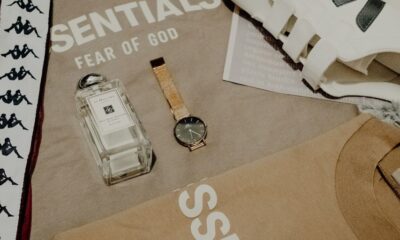Fashion
Kola Tytler Shares Top Trends in Streetwear
The dictionary definition of streetwear is straightforward: stylish, informal clothing. However, that characterization undersells what has grown into a multibillion-dollar retail phenomenon with roots in 1980s and 1990s countercultures such as graffiti, hip-hop, skateboarding, and surfing.
In essence, streetwear is the production, promotion, sale, and resale of casual clothing – primarily footwear, such as sneakers, but also T-shirts and other items – outside of traditional retail channels, frequently subverting the fashion industry’s long-held definition and dictate of how “cool” is made profitable.
Below we look at themes from recent collections, which trends the biggest streetwear brands are embracing, and what to keep in mind moving into 2022 in a category that continues to disrupt the market:
-
The Plaid “Shacket”
Since late last year, this shirt-and-jacket combination has seen steady investment across the market; nonetheless, it appears that this silhouette is more popular than ever in streetwear circles. It’s a great layering garment when paired with a graphic T-shirt or sweatshirt, and it’s fantastic for board culture aesthetics. In the spring, utilitarian ideas and industrial tones will be more prominent, and your approach to the shacket should reflect this.
-
Sneakers Are Here To Stay
Sneakers are a current trend that is here to stay, with over 4,300 footwear companies in the Italian footwear sector. dropout® is one of these companies, and it is a leading figure in the sneaker segment of the footwear industry. Kola Tytler launched dropout®, a store that focuses on the sale of limited edition sneakers as well as streetwear.
Kola had always been a fan of streetwear and shoes, which led him to collaborate with Andrea to launch a resale streetwear firm. Kola had an epiphany after purchasing a pair of Jordans, which sparked the start of his entrepreneurial journey. Kola was motivated to create a shoe bot after stumbling into the underground sneaker resale market in 2015. Kola was also assisted by the people he met on his tour. Kola had the opportunity to meet Yiannis, the founder of YEEZY Mafia, and Stefano, the founder of Outpump, an Italian streetwear journal.

Pictured: Kola Tytler
-
Printed Loungewear
It’s no secret that loungewear reigns supreme in streetwear – and this is especially true given that consumers are confined to their homes. Hoodies and joggers, which were once considered simple silhouettes, are now adorned with motifs, text graphics, and logos. This strategy, which is a step up from solid picks, not only offers the clothing a more unique feel, but also allows you to play into branding trends.
The turtleneck sweater from Fear Of God’s Essentials line was a huge hit, arriving and selling out on the same day across many shops. After receiving backing from Prada earlier this year and financing from a plethora of mass market shops, this silhouette has gained even more traction.
-
Baggy Fits
As we go towards the ’20s, it’s becoming clear that narrow fits will be recognized as one of the defining styles of the previous decade. However, silhouettes have been increasing for a few years, and we’re now seeing a clear shift towards unbridled bagginess. Nowhere is this more evident than in streetwear. However, this new style of cut isn’t just wide. Longer, baggier versions that cover the tops of sneakers are gaining hold on cropped and cuffed jeans and trousers. Hoodies and sweatshirts are once again being worn several sizes too big in order to attain a baggy fit.
Future focus: Sustainability
Streetwear companies have previously pioneered some of today’s most renowned trends and are regarded as a source of inspiration by mainstream brands. However, one of the industry’s major buzzwords is sustainability, which this market segment can no longer ignore.
Due to its tiny scale compared to big brands, streetwear is often overlooked, although it is still far from environmentally friendly. Labels acquire limited runs of blank T-shirts and hoodies to turn them into billboards for their brands, according to the company’s business strategy. Major businesses in this market, such as Supreme and Off-White, have developed empires among these consumers and are no longer a drop in the bucket. Most of these brands’ weekly drop cycles have encouraged quick consumption, which directly contradicts sustainability objectives.
Designing products with sustainable and recycled materials, avoiding overproduction, encouraging reduced consumption, and leveraging influence over a younger generation as a call to action are all fundamental cornerstones that brands should keep in mind. Reselling garments, shoes, and accessories is a wonderful strategy to avoid overproduction. Kola’s resale streetwear company is an excellent example of how the streetwear industry can contribute to sustainable practices.
Final Thought
Fashion, and especially streetwear, is forever evolving and changing. Brands and consumers alike need to keep up with these trends if they want to stay current.
-

 Press Release5 days ago
Press Release5 days agoClinical Trials Market Set for Robust Growth, Driven by Drug Development Surge and Digital Innovation
-

 Press Release6 days ago
Press Release6 days agoGreen Bio Chemicals Market Poised for Sustainable Growth amidst Global Shift to Eco-Friendly Alternatives by 2035
-

 Press Release6 days ago
Press Release6 days agoFill-Finish Pharmaceutical Contract Manufacturing Market Expected to Flourish Amid Biopharmaceutical Boom and Global Outsourcing Trend by 2035
-

 Press Release6 days ago
Press Release6 days agoIndustrial Boiler Market Expected to Surpass USD 24.4 Billion by 2035 Amid Growing Demand for Energy Efficiency and Industrialization
-

 Press Release6 days ago
Press Release6 days agoPreventive Vaccines Market to Witness Strong Growth by 2035
-

 Press Release6 days ago
Press Release6 days agoPet Food Nutraceutical Market Set for Robust Expansion Amid Rising Demand for Pet Wellness by 2035
-

 Press Release5 days ago
Press Release5 days agoPediatric Vaccines Market: Safeguarding Futures, Driving Growth
-

 Press Release6 days ago
Press Release6 days agoCat Food Market Forecast 2035: Natural Ingredients, Pet Wellness to Lead the Way



















